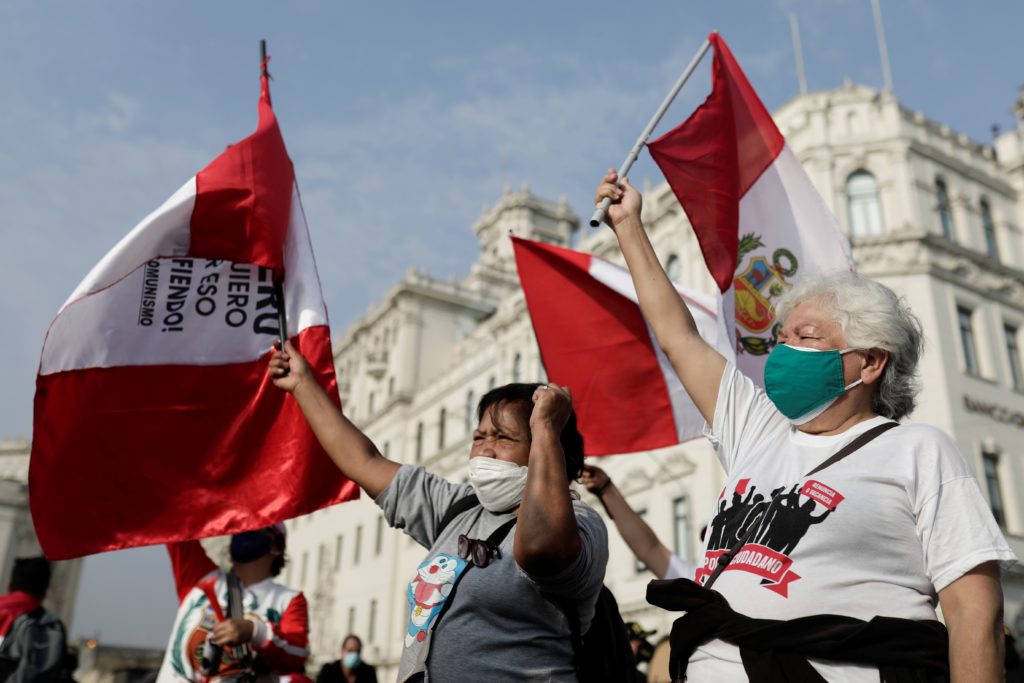Amid a political crisis in which the president, his wife and members of her family are accused of corruption and taking bribes, Peru's bishops have called for dialogue and a commitment to uphold democratic institutions.
At a news conference Aug. 18, the bishops issued a statement calling for "an urgent and creative solution" in the face of "alarming levels of political, social, economic and moral decomposition, combined with distrust on the part of a large percentage of the population, and a loss of credibility and governance."
The statement comes just after the first-year mark of the government of President Pedro Castillo, a rural teacher and union leader from the northern Cajamarca region who had no prior government experience when he took office in July 2021.
Castillo took the helm of a country reeling from the coronavirus pandemic, which claimed at least 200,000 lives and left more than a quarter of the population living in poverty. His administration has been plagued by constant turnover in key positions, with nearly 60 people having passed through the 19 top Cabinet posts so far.
His term also has been marked by constant sparring between the president and Congress. The constitution gives Congress the power to censure ministers and impeach the president, but also allows the president to dissolve Congress under certain circumstances. The result has been an uneasy standoff.
Conflicts between the president and the national Congress predate Castillo -- Peru had three presidents in just over a week in December 2020 -- but have become entrenched during his term.
"Citizens do not deserve the spectacles of confrontation within and between the public powers, especially the executive and legislative branches, as the constant confrontation deepens their loss of legitimacy, and citizens no longer feel represented by them," the bishops wrote.
The conflict, they added, is "seriously harming democracy and creating greater division and conflict, which leads to a serious confrontation among Peruvians and may lead to uncontrollable levels of violence."
The political crisis is further complicated by high levels of corruption, the bishops said, noting that a recent Latinobarómetro survey placed Peru among the four Latin American countries considered most corrupt by their citizens. Besides the president, his wife and several of her relatives, prosecutors are investigating a former government minister, half a dozen legislators and various other officials, including judges, in corruption cases.
All of the presidents elected in Peru since 1990 face corruption accusations. Former President Alan García committed suicide in 2019 when police arrived at his home to arrest him in an investigation of kickbacks from construction projects.
Castillo's supporters say the criticism of the president stems from discrimination because of his rural roots. Opponents say he is inept and undermining democracy. Castillo has tried to make leaking information about corruption investigations a crime, leading the bishops to call for the government to guarantee freedom of the press and the media to "inform and express opinions with truth, honesty and respect."
The bishops noted that corruption contributes to increased poverty, which is exacerbated by the global economic crisis. The consequences include more Peruvians suffering from hunger and precarious employment, as well as decreased spending on public services like health care and education, they said.
Amid what they called a moral and ethical crisis, the bishops called for broad-based dialogue involving all branches of government, civil society "and especially young people."
"We call on all sectors of civil society to seek, by democratic means, the reestablishment of governance and peace in our country, rejecting violence as a means of resolving conflicts," the bishops wrote, adding that the church "has been, is and always will be willing to collaborate for the good of our beloved Peru."

